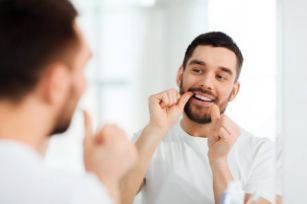
If you want to keep your smile looking and feeling great (and minimize the amount of dental work you need), you already know how important it is to brush and floss. But if you’re making any of the common mistakes below, you could be doing more harm than good. Keep reading to learn about 3 bad teeth cleaning habits that make a dentist in St. Albans cringe, and how you can correct them. You might be surprised at how a few simple tweaks can go a long way towards making sure you have fewer cavities, healthier gums and fresher breath!
1. Brushing Too Hard or Using a Hard-Bristled Toothbrush
It seems intuitive that the harder you brush your teeth, the cleaner they’ll be. But over time, you can actually wear away your enamel and make your teeth more susceptible to cavities and temperature sensitivity. It can also cause your gums to recede and expose the sensitive root surfaces of your teeth. Since the roots don’t have as much protective enamel to begin with, this can really increase your risk for tooth decay.
The first step to doing better is choosing a soft-bristled toothbrush. There are also a couple of tricks to help you “lighten up.” You can either hold your toothbrush in your non-dominant hand or try gripping it with only your fingers instead of your entire hand. It may take some getting used to, but it will definitely help you brush with less pressure.
You may also want to invest in an electric toothbrush. Nowadays, they’re available at every price point and can ensure that you’ll use less pressure than you would with a manual.
2. Only Brushing Once Per Day
Many people wake up and brush their teeth first thing in the morning, only to fall asleep at night without having done it a second time. On one hand, this makes sense because you want to start your day with fresh breath.
But you may not realize that the most important time of the day to brush is actually before bed. You don’t produce as much saliva when you sleep, which would otherwise help to wash away plaque and food debris as well as neutralize acids that cause cavities. Brushing and flossing before you fall asleep will remove any existing plaque from the day and helps you avoid the impact of dry mouth at night.
3. Flossing Incorrectly or Never At All
Brushing just gets part of the job done and has been estimated to remove only 60% of the plaque, bacteria and food from your teeth and gums. Not flossing puts you at higher risk for cavities, gum disease (which is the #1 cause of tooth loss), and bad breath.
Also, if you are flossing regularly, keep in mind that the right technique is also important. As opposed to just quickly moving the floss between the teeth, get into the habit of gently moving the floss under the gumline as well before moving on.
It’s also a great idea to ask a dentist for feedback or a demonstration at your next checkup. They’ll be able to help you with your technique as well as recommend any hygiene aids to meet your specific needs (such as floss picks, intraoral irrigators or interdental brushes).
By avoiding these 3 common mistakes, you’ll be on your way to minimizing the dental work you need and having much healthier teeth and gums. Not to mention that you’ll have a happier smile as well!
About the Author
As a family dentist in St. Albans, Dr. Simran Saini is passionate about helping people achieve outstanding oral health. Knowing the impact that everyday habits have on her patients’ teeth and gums, she always takes the time to explain the right way to brush and floss at home. If you’d like to know more about cleaning your teeth or have any other questions, she can be reached via her website or at (802) 524-4844.
